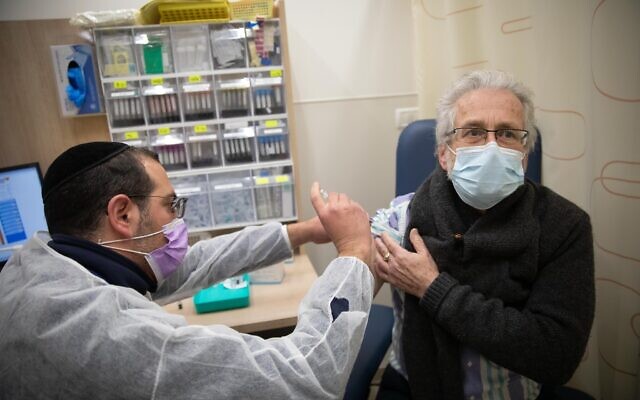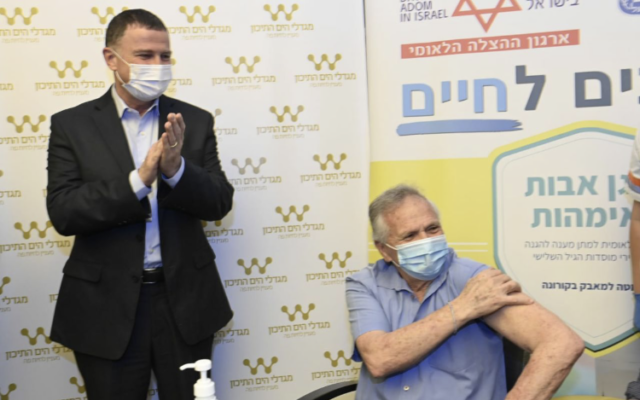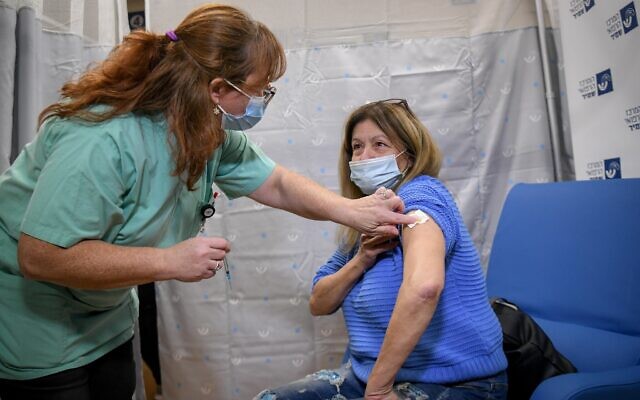Medical workers again meet government goal of 150,000 shots in a day; 5,253 new COVID-19 cases diagnosed as fatalities rise to 3,314

The Health Ministry on Thursday said that 150,600 coronavirus vaccinations were administered the day before, again beating a government-set pace for inoculations and bringing the number of people who have started the immunization process to nearly 800,000.
It was the second day in a row that daily vaccinations surpassed the 150,000 mark, which the government set as a goal for this week.
The numbers came as the death toll from the virus outbreak climbed to 3,314.
“Over 150,000 people in a day!” tweeted Health Minister Yuli Edelstein. “Within 11 days Operation Latet Katef [To Shoulder It] has vaccinated nearly 800,000 citizens. Thank you to medical teams for the difficult and important work, [done] always with a smile!”
The figure represents 7.44 percent of the entire population, maintaining Israel’s place as the leading country in the world for vaccinations per capita, according to statistics from the Our World in Data website. Second place is held by Bahrain with 3.37%, followed by the UK with 1.18%.

While the inoculation program has ramped up, so have infection rates, which prompted a third national lockdown that began on Sunday.
Health Ministry figures showed that there were 5,253 new virus cases diagnosed on Wednesday, a slight drop from the two preceding days but still the third-highest daily count since early October.
Of the 95,125 virus test results returned during the day, 5.5% were positive.
There are 42,402 active patients in the country, of whom 639 are in serious condition, with 165 on ventilators, the ministry said. Since the start of the virus outbreak in the country earlier this year 419,312 Israelis have been diagnosed with the virus.
The mass vaccination drive started at the beginning of last week and has so far focused on healthcare workers, those aged over 60, and at-risk groups. Teachers are also being added to the roster.
The drive currently uses the Pfizer vaccination, which requires two shots, spread a few weeks apart. Though not yet available to the general public, vaccination centers have also been opening their doors to all comers at the end of each day in an effort to make sure vaccine units available for immediate use do not go to waste. So far some 30% of over 60-year-olds have had their first shot, according to Health Ministry figures.
However, a shortage of injections means the ministry might be forced to semi-freeze the campaign for two weeks in January.
Unless a deal is agreed upon for Pfizer vaccine supplies due in February to arrive ahead of schedule, current stocks will run out in about 10 days at the current pace of inoculation — some 150,000 shots a day — Channel 13 reported.
The pause would allow those who have received the first dose to get the second dose, but new first doses would not be given.
This in turn will likely lead to a delay in opening vaccination to the general public. Some officials had previously assessed that could happen within a week or so, but it may now need to wait a month and a half or more, the report said.

Edelstein confirmed that his ministry may stop administering first doses for “a short period,” telling Channel 12 that “there will be no shortage of the second dose.”
The minister added that he was in contact with Pfizer officials in order to advance February’s vaccine orders to January, but said that “even if we were to stop for two weeks,” Israel would still be far ahead of any other country in inoculations per capita.
Prime Minister Benjamin Netanyahu has said Israel is aiming for some 2.25 million Israelis out of a population of 9.2 million to be vaccinated by the end of January.
As reported by The Times of Israel
